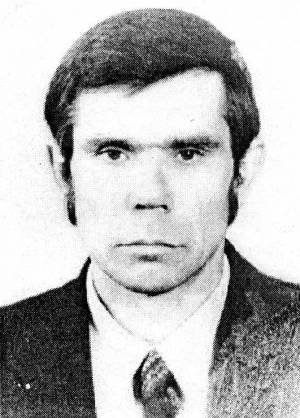A talented poet, a fighter for justice, a political prisoner.
His grandfather, Yakym, was an active participant in the revolutions of 1905 and 1917—shot by the Bolsheviks in 1931 as being close to the “Union for the Liberation of Ukraine.” Both of his sons—Nykyfor and Leonid—also wrote poetry. This gift was passed down to his grandson. His grandfather’s poems burned in their house during World War II, and the grandson paid a heavy price for his own poems.
He finished secondary school. He served in the army near Tambov (Russia). He worked at a brickyard, and as an electrician, construction worker, and cinema projectionist. In 1968, outraged by the injustice of a kolkhoz party organizer, he beat him up and was imprisoned for one year under Article 206 of the Criminal Code of the Ukrainian SSR for “hooliganism.” He had a hot, fiery temper and a heightened sense of justice. The parents of the girl he loved forbade her from marrying Leonid—he remained single for the rest of his life.
In 1971, Terekhovych read in the local newspaper that 100% of the voters in his village had voted “for” the single candidate in a by-election, when in fact the polling station had been locked all day. On March 8, 1971, he wrote a letter about this to Viktor Frank, a commentator for Radio Liberty in Sweden. The letter was intercepted in the mail, and the KGB searched his home, confiscating his poems, including “Zadolyzy” (“Sycophants”) and “O borbe s ideologicheskimi diversiyami” (“On the Fight Against Ideological Diversions”) (Terekhovych was writing in Russian at the time). He sent the latter poem to a citizen named Stryzhko in Moscow. They also confiscated a response he had written in early 1971 to American singer Dean Reed’s open letter to A. SOLZHENITSYN. The KGB found that the author, in his poems and letters, “slanders the CPSU and one of the leaders of the CPSU, and defames Soviet reality.” He was arrested on March 15, 1972, and initially charged under Article 62 of the Criminal Code of the Ukrainian SSR with conducting anti-Soviet agitation and propaganda. However, on July 1, 1972, in a closed session, the Judicial Collegium for Criminal Cases of the Chernihiv Oblast Court sentenced him under Article 187-1, “dissemination of deliberately false fabrications that defame the Soviet state and social system,” to 2 years of imprisonment in strict-regime camps. He was also accused of systematically listening to foreign radio stations and writing a number of poems with “slanderous content”: “Koe-chto o reklame…” (“A Little Something About Advertising…”), “Moskve ukrainskiy narod…” (“To Moscow the Ukrainian People…”), “Yest v derevne selsovet…” (“There is a Village Council in the Village…”), “Skazka o rabotnike balde” (“The Tale of the Blockhead Worker”), and “V literature Sholokhov mog by sdelat shorokhu” (“In Literature, Sholokhov Could Have Made a Rustle”).
He served his sentence in zone No. 46 (village of Katerynivka, Sarny Raion, Rivne Oblast). He was released in 1974, but a year later he was back in the same zone for 5 years for a fight, although his actions were merely a response to an attack. He was released in 1980. He worked as a cinema projectionist. In 1988, he was sent for two years to an LTP (labor and treatment profilactorium) in the village of Martusivka, Boryspil Raion, Kyiv Oblast. There, he unexpectedly fell ill (cerebral circulatory disorder) and was urgently discharged by a medical commission. Twenty days later at home, the stroke recurred. He went to hospitals, trying to get disability status—he was sent to a psychiatric hospital. Stanislav Repiakh, the head of the regional branch of the Writers’ Union, rescued him from there. They met in the summer of 1990; Repiakh praised Terekhovych’s poems and asked if he had tried writing in his grandfather’s language. Terekhovych switched to Ukrainian. Two notebooks with 121 poems have survived. According to critics, they, like his Russian-language poems, are marked by talent, are understandable to everyone, and are truthful and sharply critical of the authorities. Many earlier poems were confiscated and lost.
With Repiakh’s help, Terekhovych was hired as a guard at the Kuchynivka school in 1990. He participated in the work of the local branch of the Narodnyi Rukh (People's Movement of Ukraine). On May 15, 1991, his poems were broadcast for the first time on Chernihiv regional radio. They began to be published in the regional and oblast press. In 1992, Repiakh, together with the author, was preparing a collection for publication, which was also to include his grandfather's poems. But this creative spark was cut short: in August, at the train station in the town of Shchors, the poet was severely beaten by militsiya officers for unknown reasons. On August 22, 1992, he died alone in his house. His last poems are marked by a premonition of death: “Koly pomru – tse bude skoro…” (“When I die—it will be soon…”). He is buried in his native village.
Bibliography:
Leonid Terekhovych. Svidomo stav na muku. Vybrane. [He Consciously Accepted Torture. Selected Works.]. – Chernihiv, 1993. – 32 pp. (Introductions by P. Povid and V. Moskalenko).
Repiakh, Stanislav. Krok do Leonida Terekhovycha [A Step Towards Leonid Terekhovych] // Siveryanskyi litopys (Chernihiv), No. 2. – 1995; http://dhost.info/newbabilon/poetry/step.html
Terekhovych Leonid Nykyforovych http://uk.wikipedia.org/wiki/

TEREKHOVYCH LEONID NYKYFOROVYCH